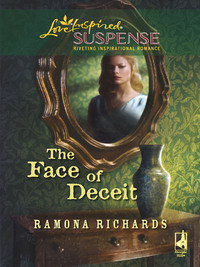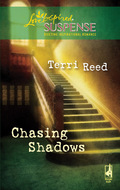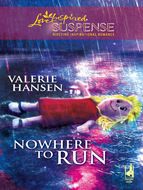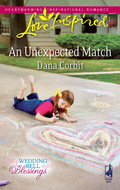Das Buch kann nicht als Datei heruntergeladen werden, kann aber in unserer App oder online auf der Website gelesen werden.
Buch lesen: "The Face of Deceit"
“I started having nightmares about being chased,” Karen said.
“I couldn’t tell who it was,” she added, “but there was this face.” She tapped the photo of her vase again. “I woke up in such a panic that I…” She swallowed. “I’d never felt a fear like that. I did the first vase in an attempt to get rid of the nightmare. I never expected to sell it—or that it would be the start of dozens of others.”
“Any idea what the dream meant?” Mason asked.
She frowned. “You mean, like an interpretation?”
“Sure. Remember that the Bible is full of dreams and visions, and most meant something significant.” Mason paused and shoved his hands into his pockets, a little puzzled by his own words. Where had that come from? He knew the Bible, but not much beyond a childhood Sunday-school level. “What if your memory is picking up on someone you really know and plopping it on those vases?” he asked.
Karen turned to him. “It can’t be.”
“Why not?” If her dreams were a memory trying to work its way out, this was the logical response, the only response. He swallowed hard, dropping his voice. “Karen, has anyone ever tried to kill you?”
Karen’s eyes met his, evenly, solidly. “Yes.”
MILLS & BOON
Before you start reading, why not sign up?
Thank you for downloading this Mills & Boon book. If you want to hear about exclusive discounts, special offers and competitions, sign up to our email newsletter today!
Or simply visit
Mills & Boon emails are completely free to receive and you can unsubscribe at any time via the link in any email we send you.
RAMONA RICHARDS
A writer and editor since 1975, Ramona Richards has worked on staff with a number of publishers. Ramona has also freelanced with more than twenty magazine and book publishers and has won awards for both her fiction and nonfiction. She’s written everything from sales training video scripts to book reviews, and her latest articles have appeared in Today’s Christian Woman, College Bound and Special Ed Today. She sold a story about her daughter to Chicken Soup for the Caregiver’s Soul, and Secrets of Confidence, a book of devotionals, is available from Barbour Publishing.
In 2004, the God Allows U-Turns Foundation, in conjunction with the Advanced Writers and Speakers Association (AWSA), chose Ramona for their “Strength of Choice” award, and in 2003, AWSA nominated Ramona for Best Fiction Editor of the Year. The Evangelical Press Association presented her with an award for reporting in 2003, and in 1989 she won the Bronze Award for Best Original Dramatic Screenplay at the Houston International Film Festival. A member of the American Christian Fiction Writers and the Romance Writers of America, she has five other novels complete or in development.
Ramona and her daughter live in a suburb of Nashville, Tennessee. She can be reached through her Web site, www.ramonarichards.com.
The Face of Deceit
Ramona Richards

In the morning, O Eternal One, listen for my voice;
in the day’s first light I will offer my prayer to You
and watch expectantly for Your answer.
—Psalms 5:3
To Sunny,
who first put me on a wheel
and let me disappear into the clay.
Your unparalleled friendship is a true blessing.
With special thanks to Vickie C. Martin
and her team at Goodlettsville, Tennessee’s
Scentaments,
for the first drops of inspiration
for Karen’s “face vases.”
“Before you do anything else,
before you center it on the wheel,
before you think about what you’re going to make,
listen to the clay. God created it;
it’s part of His world.
Honor it. Honor Him.
Listen closely.
The clay has a voice. It has a memory.
It will tell you all you need to know.”
—Jake Abernathy
Lessons to a Young Potter, 1989
CONTENTS
CHAPTER ONE
CHAPTER TWO
CHAPTER THREE
CHAPTER FOUR
CHAPTER FIVE
CHAPTER SIX
CHAPTER SEVEN
CHAPTER EIGHT
CHAPTER NINE
CHAPTER TEN
CHAPTER ELEVEN
CHAPTER TWELVE
CHAPTER THIRTEEN
CHAPTER FOURTEEN
CHAPTER FIFTEEN
EPILOGUE
QUESTIONS FOR DISCUSSION
ONE
“Not again!”
Karen O’Neill stared at the pottery shards clustered at the base of the open door, a twinge of fear tightening her chest. Her sudden words, although barely more than a whisper, startled the cat in her arms. The gray velvet half-Persian leaped free in a graceful arc over the threshold and disappeared into the hedges bordering the backyard.
“Lacey!” Karen stepped over the remains of the ceramic vase, her sense of fear escalating. “Wait!”
No good. The cat, cooped up all morning as Karen worked in her pottery studio, wasn’t listening. “As if you ever do,” Karen muttered. She quickly scanned her sloping, tree-covered backyard, searching for any signs of danger, any other human presence…any indication of who could have smashed a vase against her back door.
Karen’s own vase, in fact. One of her own unique “face vases,” a design she had first created a few years ago. Slender and marked by a distinctive white face on one side, the vibrantly colored vases had become her artistic trademark. Recently, they had become increasingly popular among galleries and collectors in the Northeast, a trend predicted by art historian Mason DuBroc, who had published an article on them. Mason, intrigued by the vases, had warned Karen that she needed to increase her output, to prepare for growing popularity. “Everyone will love them,” he’d insisted.
Someone, however, had taken a distinct dislike to the vases. A violent dislike.
Around her, the yard remained silent, revealing no clues. The only motion was from the prowling cat and a squirrel annoyed by the Persian’s presence. Even the pink and gold flowers near the door, their heady scent lured out by the warm May sun, showed no indication of a breeze or a passing human. No lurking villains, no suspicious shadows. Peaceful.
Except for the shattered vase. The third vase this month. Karen hadn’t ever heard a crash, making her think the attacker knew when she was in the house and when she was not. As a result, Karen fought a feeling of being stalked. Watched.
She shivered despite the warmth of the spring sun, then scolded herself. You’re just being paranoid. She pushed the thought away and turned back to the door, bending to look closer at the remains of the vase, careful not to touch any of the pieces. Yep, there it was, as with the other two—the scrap of paper, weighted down by one of the larger shards, that read simply, Stop!
“Stop what?” She straightened and stepped over the vase into her basement studio, still talking to herself. “Stop making vases? Stop these vases? Stop pottery altogether?”
Karen froze at the idea, looking around, her gaze moving from her shelves of pottery supplies, to the worktables, to the wheel. She could no more give up pottery than walk on the moon. Pottery wasn’t just something she did. It was her life. It had saved her life.
She took a deep breath. “Lord, give me strength,” she whispered, then headed up the narrow, wrought-iron spiral steps that led from her studio to her living room. Time to call the police. Again.
“Vandalism? That’s it? After three vases!” The barely restrained anger in the dark male voice on the other end of the phone gave Karen an odd sense of comfort. She had been tense when she’d called the police, but now she relaxed as she leaned back against her couch cushions and stretched her legs. Lacey, who’d scratched at the front door to get in almost as soon as Karen had come upstairs, sensed the change in mood. She leaped into Karen’s lap and started kneading one thigh, sharp claws pricking through Karen’s jeans.
Karen stroked Lacey idly, focusing on the voice in the phone. Mason DuBroc had become a good friend over the past few months, since his arrival in town. Well-known in the art community as half art professor and half adventurer, Mason had been the last person she’d expected to find on her doorstep one dreary January morning. Karen had read his articles and books, had followed stories about him in the press. Mason was art world A-list, and she’d reacted as if a Hollywood star had been standing there. She had stared, openmouthed, at the disheveled man, snow clinging to his floppy hat and weathered hiking boots, his questions flying at her faster than she could answer them. Now Karen found herself wondering if his deep brown eyes flashed as much in anger as they did in excitement.
“There’s not much else the local police can do, Mason. The Stop! isn’t really a threat, and they couldn’t find any fingerprints. They consider it in the same way they would if someone had spray-painted the house.”
A low growl echoed through the phone, and with each word, Mason’s Cajun accent thickened. “But this isn’t a prank. They didn’t spray-paint the house. They destroyed art! Your art! Don’t they think someone’s watching you?”
Karen closed her eyes and curled her fingers in Lacey’s fur. She didn’t really want to face that possibility. “They are going to patrol the neighborhood more often, but with the woods that start at the edge of the yard and go for miles, there’s not much they can do. They only have five patrol officers.”
“Almost wish I wasn’t in New York. Maybe you should stay—”
“I’m not going back to Aunt Evie’s, Mason.” A touch of Karen’s tension returned. “We talked about this the first time.”
“Yes, but—”
“Absolutely not.”
Karen held her breath. Mason knew all too well how tense her relationship was with the aunt who had raised her. They had battled since Karen’s teen years, and now her choice of career made her aunt annoyed and critical.
“What about Jane? She’s your best friend.”
“I’m allergic to her dog.”
Silence.
“Mason, I don’t want to be forced out of my home. I worked too hard to make it my own.”
Mason broke the thick silence that followed by clearing his throat. “Chère, the auction starts this afternoon at three. If it goes as I hope, your profile will be even higher in the art world. Are you ready for that? More orders? More attention?” He paused. “Maybe more broken vases?”
Karen looked down as Lacey settled in for a nap, her purr a soft vibration under Karen’s fingers. Karen, too, felt calmer. Chère. He’d started calling her that a few weeks ago, pronouncing it “Sha,” and using it mostly when they were alone. She wasn’t sure what it meant, but every time he said it, she felt herself relax. “Yes,” she softly. “More orders, yes.”
“And the attention?”
Lacey’s breaths became light and even, her back barely rising and falling under Karen’s hands. The young potter looked around at her cozy living room. Her adored hillside house, with its narrow three stories, barely contained a thousand square feet. Yet it was something she’d craved as long as she could remember: her own home. Her studio took up the entire basement, and a living room and galley kitchen filled the main floor. Upstairs, her office, bedroom and bathroom made up the rest of the space. She loved it here. She’d renovated the small house, made it her own—her first real private space in the twenty-eight years of her life. Built into the side of a New Hampshire hillside, the back walls were all glass, looking out over a backyard that was more vale than lawn. Here in Mercer she had her home, her art, her friends. This, she thought, is happiness.
“Mason, I live in a tiny house in a tiny town in the middle of nowhere. How much attention could actually find its way all the way to Mercer?”
“Karen,” he said softly, “you have no idea.”
Karen hung up the phone after promising to say a prayer for him about the auction, once again wondering what it was about her “face vases” that had such an impact on him.
“Why me, Lacey?” she wondered aloud, thinking back to her first meeting with Mason. The sleeping cat ignored her. “It was like I opened the door and found Indiana Jones standing there.”
The comparison with the fictional movie hero wasn’t quite accurate, but it wasn’t all that far off, either. Mason DuBroc, flamboyant and half-Cajun, with an accent that made folks around Mercer pay attention to every word, definitely took the award for oddest character to ever enter Karen’s world. A dubious claim, since a potter’s life, by nature of her chosen career, overflowed with artists, collectors and students, most of whom had the usual quirks that went along with a creative spirit. The author of a bestselling book on art crime, Mason had come to Mercer to take up residence at Jackson’s Retreat, a writers’ colony on the other side of the expansive woods that began almost at Karen’s back door.
He’d discovered Karen’s vases in the window of a local art gallery, and had immediately sought her out. Mason’s fascination with her art intrigued her, but she’d hesitated to ask the larger-than-life character about it, almost as if the interest would evaporate with the inquisition. He thought the vases museum-worthy, and for the past few weeks Mason had been on a mission to raise Karen’s profile as an artist. He’d helped her put up a Web site, and he’d sold an article about her to a pottery magazine, which had been reprinted in other publications. The article had led to the New York Times publishing two inches of coverage on her last gallery showing in SoHo. Then last week Mason had heard about this auction, and it had quickly become his latest effort.
“I just don’t understand, Lord,” she whispered. “Why me?”
The front door shot open with a bang, and Karen leaped off the couch with a screech, sending Lacey flying. The cat hit the ground, claws out, and flashed under a chair on the other side of the room as an alto voice rang out over all three floors. “Laurie’s daily special was lasagna with peach pie. Hope you’re hungry! Are you ever going to start locking that door?”
Karen glared at her best friend as she sailed into the room. “Jane! Are you determined to scare me half to death? What are you doing here?”
Jane Wilson, owner of the Heart’s Art Gallery in downtown Mercer, opened her arms in greeting, to-go bag in hand. “Aha! There you are.” She held the bag higher. “Lunch! I heard about the vase. Knew you’d need company. Have you talked to Mason about this afternoon’s auction?”
Karen blinked. “What?”
“You think he’ll be able to buy the vases? He should. I know just his being there will help, but I mean, if he could buy them, you do think he wants to, right? Why wouldn’t he? Come on. Lunch is getting cold.” Long dark curls swinging around her shoulders, Jane headed for the kitchen.
Karen relented, brushing cat hair from her lap. Jane’s enthusiasm flattered her. Jane’s gallery anchored Mercer’s arts district, and she’d been one of Karen’s staunchest supporters since their teens. When Karen had decided ten years ago that she could, in fact, make a living as a potter, Jane had started putting Karen’s unique vases and clay art in the windows of her gallery—which was where Mason had first spotted them.
“No idea if he’ll be able to buy them or not. I’m still not sure what good this will do.”
Jane set the bag on the counter, then turned to pull plates from a cabinet. “Karen, darling, I love your naïveté sometimes. Why don’t you make fresh coffee? Your special blend Kona has been on my mind since I left the gallery.”
“Jane—”
“No, c’mon, Karen, I’m serious. He’s Mason DuBroc. Dr. Mason DuBroc. Well-known author of a book on art crime in Middle Eastern war zones so full of adventure that it would make Indiana Jones jealous.”
Karen scowled. There was that comparison again. “I know who he is, Jane. I knew that when he first showed up on my doorstep.”
“Look, girl, Mason may not brag about it around you or around the retreat, but he knows the worth of his own name right now. For him to even bid for your vases—”
“Okay, I get it.”
Jane paused in her frenzy of activity. “So what’s the problem?”
Karen stood up and walked to the tall windows at the back of the dining area, looking out over the trees that bordered the lawn. Her property sloped down and away from the house, then back up into woods that stretched into the distance.
She loved those woods. There was a path that led through the heart of them, all the way to the writers’ colony where Mason lived. But it had not been the path that had brought him to her door, and she still couldn’t shake her confusion about what had brought him to her.
Karen cleared her throat. “The problem is that I keep asking, ‘Why me?’ Why did Mason DuBroc, of all the people on the planet, suddenly focus so much of his interest on my vases and me? What does he want with me?”
“Afraid he’ll make you successful?”
Karen turned away from the windows. “Don’t try to psychoanalyze me, Janie. You’re not good at it and I’m not in the mood.”
Jane chuckled, a low, throaty sound. “Okay, so you’re a little suspicious. I can’t blame you. It did seem a little odd when he showed up in the shop, bouncing around the displays and asking all these questions about your vases, but he’s an odd bird.” She took a deep breath. “Did I tell you that he tried to lecture two of my customers on the relation of your vases to Southern folk art face jugs?” Jane’s words picked up speed as she resumed emptying the lunch bag. “I mean, this couple hadn’t been in the shop thirty seconds! They fled before I could get out ‘Welcome to Mercer, New Hampshire.’”
Karen bit her lip to keep from laughing. “That sounds like him.” Joining Jane in the kitchen again, she pulled a bag of Kona coffee from the freezer and a jug of filtered water from her fridge. The sight Mason had made standing on her porch that first day drifted through her mind as she prepared a fresh pot of coffee.
His notoriety intimidated Karen, but his peppered questioning cut to the heart of her craft, its history and its techniques. The accent certainly caught her off guard, as well. Southern but not twangy, the slow, easy-spoken combination of Alabama flatwoods and Louisiana bayou had a thick Cajun edge to it, and when excited, Mason would occasionally season his sentences with French words or phrases that Karen never understood. At least…she thought they were French.
His looks had also gotten her attention, almost as much as the accent. Jane made him sound antic and half-mad, but Mason DuBroc was far from an absentminded professor. His brown eyes were intense and held a curiosity that seemed relentless. His lean frame was wiry, and his dark hair hung mostly straight, with a tendency to curl just on the ends. His eyes and skin were darker than most of the men she knew, and he had high cheekbones so sharp they could have sliced bread. He called himself “a mutt, a result of a lot of familiarity between the Native Americans, Cajuns and a conglomerate of English and Scottish folks hanging out in the Delta,” a description that made her own mostly Irish and German heritage sound downright plain.
And the way he smelled. Aromas were vital to Karen, and she didn’t know if he wore a cologne or if his scent came naturally from who he was and what he did. He smelled like…Karen searched her mind for a comparison. Like opening a new book in the middle of a pine grove. Maybe a hint of sage. Whatever. It made her want to stand closer to him, and she inhaled deeply, just thinking about it.
“Do you want Parmesan on the lasagna?” Jane asked as she lifted one of the wrapped plates from Laurie’s Federal Café. The café was known for its home-style meals and white decor, which Laurie kept scrubbed and polished: solid white tables, chairs and dishes. Laurie refused to use chintzy to-go containers, insisting that the locals were honest enough to return real dishes.
Karen snapped back to the present as the thick garlicky scent of the lasagna got her attention. “What? Oh. Yes.”
“Thinking about Mason again?”
Karen sniffed. “No. Yes. A little. Maybe. How is Laurie?”
Jane went with the change of subject as she pulled the wrapped paper off the plates and dusted the Parmesan over the entrées. “Cool as ever. Two of the old farmers who hang out there in the mornings got into some kind of squabble about crop rotation this morning, and she told them she’d start serving only decaf if they didn’t quit. Settled them down right away.” Jane paused, then picked up the plates and headed to the table. “She also wanted to know if you had turned serious about Mason yet.”
Karen pulled two mugs from a cabinet and ignored the question. “How did you hear about the vase?”
Jane barked a laugh. “You’ve lived here all your life. How do you think I heard?”
“The Peg Madison party line?”
“Her only son may be police chief, but I think she mothers everyone in town. She’s worried about you.”
Karen watched as the coffeemaker gurgled out its last drops, steam rising from the pot and the filter bucket. Even the scent of the rich, dark coffee refreshed her and she inhaled deeply. “Please tell Mama Peg that I’m fine.”
“Which vase was it?”
Karen shrugged. “Too shattered to be sure. One of the emerald-green ones I made early last year, I think. The bigger shards were green and orange. I did find the mark, but it was just the KONA, without the diamond.” Every potter scratched a distinctive mark into the bottom of each piece, a way of signing the artwork. At first Karen had used only her initials, KO, but over the past two years, her mark had evolved into a distinctive KONA, which stood for both her favorite coffee and for Karen O’Neill Artworks.” Late last year she’d added a diamond shape to it.
She pulled the coffeepot out of the maker and filled the two mugs. “I just don’t understand—” She broke off and fanned her free hand as if to wave away the question. “I guess there are nuts in every business.”
Jane picked up the plates and headed to the dining table. “Sister, you said a mouthful.”
That afternoon, Karen returned to the studio to get her mind off the auction. She soon lost herself in the work. The whirling pot on the wheel before her so captured her that Lacey finally resorted to using claws to get her attention. Karen jumped, an action that caused one finger to break through the wet clay on the wheel, turning a shimmering vase into a pile of mud.
“Lacey!” Karen stopped the wheel, scolding the gray half-Persian at her feet. She cupped the distorted clay mound in both hands while glaring at Lacey. “Look at that!”
The golden eyes of the annoyed feline didn’t relent, and the ferocious meow and sharp swish of tail that followed told Karen that she needed to forget about ruined art and open the back door now.
“All right!” Karen glanced at a clock near the door and immediately felt a twinge of chagrin. “Four-fifty! No wonder you’re desperate.” She sighed and headed for the door, followed by the prancing cat. “Sorry about that. I should have let you out before I started. You know how I get.”
Meow. Swish.
Karen laughed and used the towel hanging at her waist to open the door to her basement studio. Lacey fled, her thick gray coat a quilt of light and dark shadows as she moved through the fading sunlight. Karen glanced down at the threshold again, but only a light shifting of clay dust remained from this morning. She closed the door again and returned to her wheel, sinking down on the stool behind it, her mouth twisted into a grimace as she gently touched the destroyed vase. It had been on its way to beauty, molded from a brownish lump of clay to an emerald-green work of art. “Sorry.”
Karen molded the wet earth back into a ball but didn’t restart the wheel, suddenly aware of how tense her shoulders were and how much her back and arms ached. “Four-fifty,” she repeated. Almost four hours had passed since she’d sat down at the wheel. Not unusual, though. When the wheel began to turn, the moist clay changing shape beneath her hands, Karen lost track of time, space, even the air around her. Her aunt, Evie, not understanding how Karen could so completely lose herself in the artwork, called it “that thing with the clay.” When she worked, Karen’s world narrowed to the wheel and the clay, and the only sensations that she remained aware of were the musty smell of damp earth and the feel of the water and earth beneath her hands. She’d been known to work five hours straight as her art formed under her hands. As a result, she usually let Lacey out before she sat down at the wheel, but this afternoon she’d forgotten.
Karen stood, rolling her shoulders, and went to the sink to wash her hands. Time for a break, more coffee, maybe check to see if there were new orders on her fax machine. Or e-mail from Mason. She pulled the towel from the waistband of her jeans and dried her hands.
Karen paused, her hands wrapped in the worn towel, looking at a shelf holding nine vases similar to the ones Mason planned to bid on. Each stood about eighteen inches high, broad at the base, a bit narrower in the middle and flared at the top with the edges jagged and wild, points and curves going in all directions. “Face vases” were not unique in the world of ceramics, but what made Karen’s vases distinctive was the face itself. Neither male nor female, it was a horror mask, twisted and grotesque on some, leering and grinning realistically on others. The vase colors were a kaleidoscope nightmare, swirling around the face in stripes and curls. Although each vase featured different colors, the face remained the same, which was especially noticeable when they were lined up together. The same down-turned eyes, full lips and white streaks slicked back from the scalp. Of course they’re the same, she thought ruefully. They come from the same source.
Tossing the towel over the edge of the sink, Karen headed upstairs, pausing to glance out the windows at the back of the studio at Lacey, now in the process of stalking a wayward butterfly. The metal of the stairs chilled her feet, so she scuffed them a bit on the carpet of the small dining area that separated the stairs from the kitchen. She poured the last cup from the lunchtime pot of Kona into a ceramic mug, and headed up the stairs near her front door.
A polite scratching on the door stopped her, and she opened it. “Already?” she asked as Lacey strolled past her, tail held high. “I thought you were on a butterfly hunt out back.”
No meow this time, just a thank-you figure eight around Karen’s ankles. Then both of them headed upstairs to Karen’s office, where an odd-looking sheet of paper slowly peeled its way through her fax. She pulled it off the machine and turned it around.
The fax had rendered it black and white, but the sheet was clearly a page from an auction house catalog, and Karen grinned as she recognized the angular, dramatic handwriting of the phrase scrawled across the bottom.
Lot 21 could be your salvation. Lot 21, which consisted of four unique vases of Karen’s own design.
“Sorry, Mason,” she murmured, her eyes bright with amusement. “My salvation comes from a much higher source.”
Yet she knew what he meant, and she glanced at the Felix the Cat clock on the wall behind her computer: 5:05. The auction must be over by now. The fax machine clicked and whirred again, and a second sheet emerged. This one was white, with only four lines scrawled across it.
$8,000!!! Didn’t get them. Will talk to agent who did. See you tomorrow!! M
The paper fluttered, blurring the words, as her hands shook. “Eight thousand?” Her knees weakened and Karen sat hard in her office chair. Tears blurred her eyes. Two thousand apiece! She’d never gotten more than five hundred for one of her vases. Mason DuBroc had succeeded in almost quadrupling their value.
Velvety fur brushed her ankles, and Karen glanced down as Lacey circled around her bare feet again. Her hands still quivering, she clicked her tongue and, with a rattling purr and tinkling bell, the eight-pound fur ball landed in her lap. Karen scratched the cat beneath the chin and was rewarded with a swish of Lacey’s thick tail.
“Lacey.” The shudder in her voice did not surprise her. Karen felt as if she were shivering from head to toe. “I’d better get back to work.” She nodded, then reached for the phone. “First I have to call Jane.”
Jane insisted on taking Karen to Portsmouth to celebrate, buying her dinner in a cozy boutique restaurant near the water. When they returned, midnight had come and gone, but Karen still felt wired and restless. Wandering into the office, she found fourteen new orders for “face vases” waiting on the fax machine. She glanced through them, overwhelmed. “Oh, Mason. What have we done?”
Sleep helped. The next morning a much calmer Karen awoke early and this time let Lacey out before she even showered. Then she took her first coffee of the day out on the back deck of the house, raising it toward the heavens. “Thank You, Lord,” she said aloud. She settled in one of the deck chairs and sipped again, then set the cup on the deck rail and looked out over the yard, feeling blessed. The sun struggled to get above the tallest trees, barely illuminating the May morning with bands of gold shot through the mist. Karen’s hair, still darkened from its normal red-gold sheen by her morning shower, dried quickly in the early-morning breeze, and she fluffed it before picking up the mug again.
This was her time. Prayer time. The day never felt quite right without it. The sun now winked at Karen over the top of her tallest birch, and she closed her eyes for a moment. Taking a deep breath, she whispered, “Thank You, Lord. I know Your hand is in all this, all along. Thanks for bringing Mason to Jackson’s Retreat to write his book, and thank You for…”
Die kostenlose Leseprobe ist beendet.








